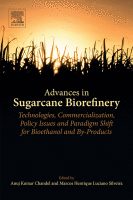Browse content
Table of contents
Actions for selected chapters
- Full text access
- Book chapterAbstract only
Chapter 1 - Sugarcane Cultivation: Soil Mapping, Environmental Effects, and New Sugarcane Varieties
Jorge L. Donzelli, Fernando C. Bertolani and Natalia de Campos Trombeta
Pages 1-15 - Book chapterAbstract only
Chapter 2 - Sugarcane Trash as Feedstock for Biorefineries: Agricultural and Logistics Issues
Marcelo A. Pierossi and Fernando C. Bertolani
Pages 17-39 - Book chapterAbstract only
Chapter 3 - The Use of Synthetic Biology Tools in Biorefineries to Increase the Building Blocks Diversification
André T.V. Hermann, Aline L. Gonçalves, ... Fernando Segato
Pages 41-72 - Book chapterAbstract only
Chapter 4 - Technological Advancements in 1G Ethanol Production and Recovery of By-Products Based on the Biorefinery Concept
Jessica C. Bergmann, Débora Trichez, ... João R.M. Almeida
Pages 73-95 - Book chapterAbstract only
Chapter 5 - Bioconversion of Hemicellulose Into Ethanol and Value-Added Products: Commercialization, Trends, and Future Opportunities
Anuj K. Chandel, Felipe A.F. Antunes, ... Silvio S. da Silva
Pages 97-134 - Book chapterAbstract only
Chapter 6 - Second Generation Ethanol Production: Potential Biomass Feedstock, Biomass Deconstruction, and Chemical Platforms for Process Valorization
Marcos H.L. Silveira, Bruno A. Vanelli and Anuj K. Chandel
Pages 135-152 - Book chapterAbstract only
Chapter 7 - Sugarcane Vinasse, Molasses, Yeast Cream: Agricultural, Environmental, and Industrial Aspects
Amol Sheth and Prasanna Borse
Pages 153-161 - Book chapterAbstract only
Chapter 8 - Valorization of By-Products Following the Biorefinery Concept: Commercial Aspects of By-Products of Lignocellulosic Biomass
Richa Arora, Nilesh K. Sharma and Sachin Kumar
Pages 163-178 - Book chapterAbstract only
Chapter 9 - Nanocelluloses From Sugarcane Biomass
Bárbara Pereira and Valdeir Arantes
Pages 179-196 - Book chapterAbstract only
Chapter 10 - Techno-Economic Analysis of Cogeneration of Heat and Electricity and Second-Generation Ethanol Production from Sugarcane
Marina O.S. Dias, Danilo R. Lima and Adriano P. Mariano
Pages 197-212 - Book chapterAbstract only
Chapter 11 - Life Cycle Assessment of Sugarcane Biorefinery: Energy Use, Environmental Assessment, and Other Sustainability Indicators
Mahdi Mazuchi
Pages 213-239 - Book chapterAbstract only
Chapter 12 - Comparative Account of Carbon Footprints of Burning Gasoline and Ethanol
Rajiv Ganguly and Vijay Kumar Garlapati
Pages 241-252 - Book chapterAbstract only
Chapter 13 - Global Ethanol Market: Commercialization Trends, Regulations, and Key Drivers
Lilian Maluf de Lima and Mirian Rumenos Piedade Bacchi
Pages 253-277 - Book chapterAbstract only
Chapter 14 - Evolution in Public Policies Designed to Develop the Sugar–Energy Industry in Brazil
Carlos E.F. Vian, Luciano Rodrigues and Haroldo J.T. da Silva
Pages 279-306 - Book chapterNo access
Index
Pages 307-317
About the book
Description
Advances in Sugarcane Biorefinery: Technologies, Commercialization, Policy Issues and Paradigm Shift for Bioethanol and By-Products, by Chandel and Silveira, compiles the basic and applied information covering cane and biomass processing for sugar and ethanol production, as well as by-products utilization for improving the economy of sugarcane biorefineries. In this unique collection of 14 chapters, specialists in their field provide critical insights into several topics, review the current research, and discuss future progress in this research area.
The book presents the most current advances in sugarcane biorefinery, including sugarcane crop cultivation, new sugarcane varieties, soil health, mechanization of crop, technical aspects of first and second generation ethanol production, economic analysis, life cycle assessment, biomass logistics and storage, co-generation of heat and electricity, process intensification and alternative by-products utilization. The book also explores the business ecosystem of sugarcane biorefineries, marketing analysis of ethanol demand and price dwindling patterns, aiming for a futuristic scenario. This book will be especially useful for scientists, researchers and technicians who are working in the area of biomass based biorefineries, as well as professionals in the sugar and alcohol industry. It also brings relevant content for policy makers, market analysts, agriculture scientists and managers.
Advances in Sugarcane Biorefinery: Technologies, Commercialization, Policy Issues and Paradigm Shift for Bioethanol and By-Products, by Chandel and Silveira, compiles the basic and applied information covering cane and biomass processing for sugar and ethanol production, as well as by-products utilization for improving the economy of sugarcane biorefineries. In this unique collection of 14 chapters, specialists in their field provide critical insights into several topics, review the current research, and discuss future progress in this research area.
The book presents the most current advances in sugarcane biorefinery, including sugarcane crop cultivation, new sugarcane varieties, soil health, mechanization of crop, technical aspects of first and second generation ethanol production, economic analysis, life cycle assessment, biomass logistics and storage, co-generation of heat and electricity, process intensification and alternative by-products utilization. The book also explores the business ecosystem of sugarcane biorefineries, marketing analysis of ethanol demand and price dwindling patterns, aiming for a futuristic scenario. This book will be especially useful for scientists, researchers and technicians who are working in the area of biomass based biorefineries, as well as professionals in the sugar and alcohol industry. It also brings relevant content for policy makers, market analysts, agriculture scientists and managers.
Key Features
- Presents technological updates on biomass processing, system biology, microbial fermentation, catalysis, regeneration and monitoring of renewable energy and recovery processes
- Includes topics on techno-economic analysis, life cycle assessment, sustainability, markets and policy
- Explores the future potential of biorefineries with zero or near zero waste, and the potential of valorization of all by-products, including alternatives to current applications and the management of a large amount of residues
- Presents technological updates on biomass processing, system biology, microbial fermentation, catalysis, regeneration and monitoring of renewable energy and recovery processes
- Includes topics on techno-economic analysis, life cycle assessment, sustainability, markets and policy
- Explores the future potential of biorefineries with zero or near zero waste, and the potential of valorization of all by-products, including alternatives to current applications and the management of a large amount of residues
Details
ISBN
978-0-12-804534-3
Language
English
Published
2018
Copyright
Copyright © 2018 Elsevier Inc. All rights reserved.
Imprint
Elsevier
